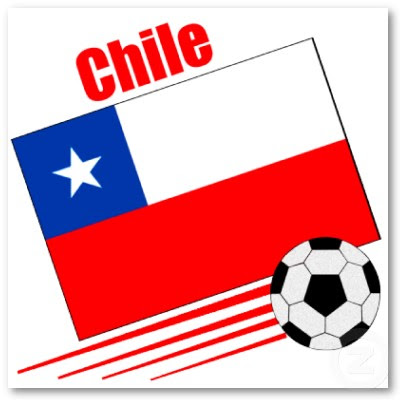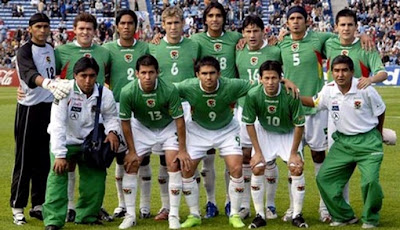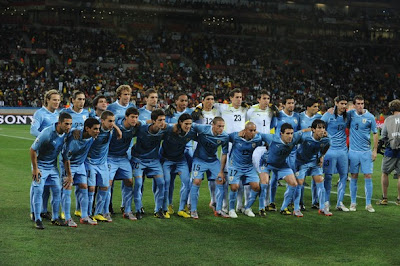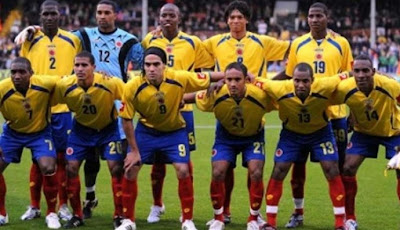Minggu, 24 Juli 2011
Selasa, 12 Juli 2011
mexico national soccer team



The Mexican national football team represents Mexico in association football and is governed by the Mexican Football Federation (FMF), the governing body for football in Mexico. Mexico's home stadium is the Estadio Azteca and their head coach is José Manuel de la Torre. The team is currently ranked 9th in the FIFA World Rankings and 9th in the World Football Elo Ratings.
Mexico has qualified for fourteen World Cups and has qualified consecutively since 1994; Mexico played France in the very first match of the first World Cup on 13 July 1930. Mexico's best progression was reaching the Quarterfinals in both the 1970 and 1986 FIFA World Cups, both of which were staged on Mexican soil.
Mexico is historically the most successful national team in the CONCACAF region, as they are the only team from the region to win an official FIFA recognized title. They hold one FIFA Confederations Cup, nine CONCACAF championships, including six CONCACAF Gold Cups, one North American Nations Cup and two NAFC Championships.
Although Mexico is under the jurisdiction of CONCACAF, the national football team has been regularly invited to compete in the Copa América since Ecuador 1993 finishing as runner-up twice and obtaining the third place medal on three occasions.
Source : Wikipedia.com
Uruguay National Soccer Team



The Uruguay national football team represents Uruguay in international association football competition and it is controlled by the Asociación Uruguaya de Fútbol.
Uruguay is currently number eighteen in the FIFA world rankings, and is considered to be one the strongest teams in South America. Along with Argentina, Uruguay has won the most Copa América tournaments, with 14 titles each one. The team has twice won the FIFA World Cup, including the first World Cup in 1930 as hosts, defeating Argentina 4–2 in the final. They won their second title in 1950, upsetting hosts Brazil 2–1 in the final match. They have won the Gold Medals in football at the Summer Olympics twice, in 1924 and 1928, before the creation of the World Cup. They also won the 1980 Mundialito, a tournament among former World Cup champions (except England, substituted by the Netherlands) held in 1980 in Uruguay to celebrate the 50th anniversary of the first World Cup. In total they have won 19 official titles (the record shared with Argentina for the most international titles held by a country): two times the FIFA World Cup, two times the Olympic Games medals, 14 times the Copa América and the only Mundialito ever held.
Their success is amplified by the fact that the nation has a very small population of around 3.5 million inhabitants. Uruguay is by far the smallest country in the world to have won a World Cup. (The second smallest country, by population, to have won the World Cup is Argentina with a total population of over 40 million people.) Uruguay is also the smallest country ever to win any World Cup medals. In fact, only six nations with their current population smaller than Uruguay's have ever participated in any World Cup: Northern Ireland (3 times), Slovenia (twice), Wales, Kuwait, Jamaica and Trinidad and Tobago. Uruguay is also the smallest nation to win Olympic gold medals in any team sport.
The level of the Uruguay national team decreased in the seventies, as Uruguay has only qualified on four occasions in the last nine World Cups, although it has always remained a strong team in South America, having reached third place and fourth place in the last two Copa América tournaments respectively. However, the present generation of Uruguayan players is widely considered among the very best in their country in the last five decades and helped the National team finish fourth in the 2010 World Cup in South Africa.
Source : Wikipedia.com
Source : Wikipedia.com
Perú National Soccer Team


The Peru national football team represents Peru in international football competition and is managed by the Peruvian Football Federation (FPF). The team competes against the other nine members of FIFA's CONMEBOL conference, which encompasses the countries of South America. The traditional colors of the team are white and red, the colors of the Peruvian flag, and the team is commonly known as la Blanquirroja (Spanish for "the white-and-red").
Founded in 1927, the team plays its home matches primarily at the Estadio Nacional in Lima. The team is a reflection of the multicultural society of Peru. Peru has won the Copa América on two occasions, and qualified for four FIFA World Cups and two Olympic tournaments; it has gone as far as the quarterfinal stage in both tournaments. Peru's traditional footballing rival is Chile, but the team also has a prominent rivalry with neighboring Ecuador.
The Peruvian team's performance has been inconsistent, although it is considered to have had two golden eras in football history (the 1930s and 1970s). The side's early years saw World Cup participations and victories in the 1938 Bolivarian Games and the 1939 Copa América, led by football legends Juan Valdivieso, Alejandro Villanueva, and Teodoro Fernández. Its 1950s side, which included Alberto Terry and Valeriano López, was considered to be among the top 20 strongest footballing nations of the decade, despite not winning any major tournaments. The golden generation of Peruvian football in the 1970s brought Peru back into the world view, with players such as Héctor Chumpitaz, Hugo Sotil, and Teófilo Cubillas leading to the belief that a new footballing powerhouse had emerged. This team qualified Peru for three FIFA World Cups, and won the Copa América in 1975.
Peru's 1982 World Cup participation was its last to date: the national team has not seen a major tournament victory or World Cup participation in over 27 years. The team was temporarily suspended from international participation by FIFA in late 2008 due to allegations of corruption between government sport authorities and the FPF. Peru has currently appointed Uruguayan Sergio Markarián as its head coach with looks of a successful participation in the 2011 Copa America and qualification to the 2014 FIFA World Cup.
Source : Wikipedia.com
Senin, 11 Juli 2011
Chile national football team


The Chilean national football team represents Chile in all major international football competitions. The team is controlled by the Federación de Fútbol de Chile which was established in 1895. They have appeared in eight World Cup tournaments and were hosts of the 1962 FIFA World Cup finishing in third place.
History
The Federación de Fútbol de Chile is the second oldest South American federation, having been founded in the port city of Valparaiso on June 19, 1895.
Chile is one of the four founding member nations of CONMEBOL, together with Argentina, Brazil, and Uruguay, the four competed in the first South American Championship, later to be renamed the Copa America, in 1916.
Chile was one of the thirteen national teams that competed in the inaugural World Cup in 1930. The team started off well, beating Mexico and France without conceding a goal. A 3–1 loss to Argentina in the final game left the Chilean team in second place within the group, eliminating it from the tournament. In the 1950 World Cup, Chile defeated the United States, 5–2, but nethertheless was eliminated in the first round.
The best Chilean result in the World Cup was third place in 1962, as the host nation. Chile lost 4–2 to eventual champion Brazil in a semi-final but went on to defeat Yugoslavia 1–0 to earn third place. Chilean players made two World Cup firsts: the first player to miss a World Cup penalty kick was the Chilean Guillermo Subiabre, in a 1930 FIFA World Cup match against France, and Carlos Caszely of Chile became the first player to be sent off with a red card, during a match against West Germany at the 1974 World Cup.
Source : Wikipedia.com
Source : Wikipedia.com
Colombia Football National Team

The Colombian national football team represents Colombia in international football competitions and is controlled by the Colombian Football Federation. It is also a member of the CONMEBOL. They have been champions once in the 2001 Copa América, which they hosted. They were also runner-ups in the 1975 Copa America won by Peru.
The Colombian National team was one of the strongest and most successful teams of Association football between 1985 and 2001, and are known for having unforgettable moments throughout their history, such as the historic 5-0 defeat of Argentina in 1993 and the Scorpion Kick debut created by Rene Higuita at Wembley Stadium, London, in 1995. Famous football players such as Carlos Valderrama (El Pibe), Faustino Asprilla and Rene Higuita (El Loco) have been key members of the team throughout its history.
However, in recent years the team has failed to be as strong as it once was, being unable to qualify for the FIFA World Cup since 1998. Colombia has had problems throughout the recent years to bring back their rich football heritage and live up to the legacy of the older Colombian generations that rose up the national team's reputation.
Since the rise of 'Colombian Football' in the mid 1980s, the national team has stood as a symbol of Colombian pride and has proved being a stronghold for fighting the negative stereotypes towards the country's reputation. The team retains a very passionate and loyal fan base, in both national and international games.
Source : Wikipedia.com
Costa Rica Soccer National Team

The Costa Rica national football team, nicknamed La Sele, is the national team of Costa Rica and is controlled by the Federación Costarricense de Fútbol. Costa Rica is the fourth most successful team in CONCACAF after Honduras, Mexico and the United States. They are the second most successful team in Central America having qualified for three World Cups, reaching the last sixteen on their debut in Italy 1990 and putting on a solid showing in 2002 where they were drawn in the same group as eventual champions Brazil and third-place finishing Turkey.
In 2006, Los Ticos qualified for the World Cup in Germany, with their worst World Cup finish ever, finishing 31st out of 32 teams. Costa Rica have been CONCACAF champions three times (1963, 1969, 1989) and have won the UNCAF Nations Cup six times. The nation has also participated in three Copa América tournaments, making the quarterfinals on their last two visits.
Sorce : Wikipedia.com
Sorce : Wikipedia.com
Minggu, 10 Juli 2011
Bolivia Soccer Team


The Bolivia national football team is the national team of Bolivia and is controlled by the Federación Boliviana de Fútbol. After playing in the 1930 and 1950 World Cups, they qualified just once—in 1994. There, playing champions Germany in the tournament's opening game in Chicago, Bolivia lost 1-0 as Marco Etcheverry, considered the nation's best player of the 1990s, got sent off just three minutes after coming on as a substitute. They have never advanced past the first round of any World Cup, and have only scored one goal in the final stages, in 1994. However, they did win the Copa América in 1963.
Source : Wikipedia.com
2011 Copa América

The 2011 Campeonato Sudamericano Copa América, better known as the 2011 Copa América or the Copa América Argentina 2011, is the 43rd edition of the Copa América, the main international football tournament for national teams in South America. The competition is organized by CONMEBOL, South America's football governing body, and is being held in Argentina from July 1 to July 24, 2011. The draw for the tournament was held in La Plata on November 11, 2010. The defending champion is Brazil. The highest finishing CONMEBOL team (other than Brazil) will earn the right to compete for the 2013 FIFA Confederations Cup hosted by Brazil.
Source : Wikipedia.com
Langganan:
Postingan (Atom)







